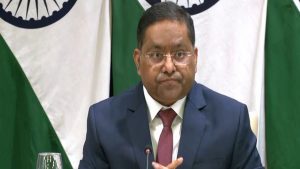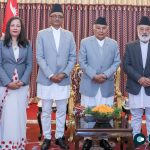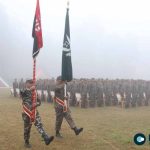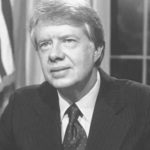
Biden calls mutiny a ‘struggle within the Russian system’

US President Joe Biden declared Monday that the United States and NATO played no part in the Wagner mercenary group’s short-lived insurrection in Russia, calling the uprising and the longer-term challenges it poses for President Vladimir Putin’s authority “a struggle within the Russian system.”
Biden and U.S. allies supporting Ukraine in its fight against Russia’s invasion emphasized their intent to be seen as staying out of the mercenaries’ stunning insurgency, the biggest threat to Putin in his two decades leading Russia. They are concerned that Putin could use accusations of Western involvement to rally Russians to his defence.
Biden and administration officials declined an immediate assessment of what the 22-hour uprising by the Wagner Group might mean for Russia’s war in Ukraine, for mercenary chief Yevgeny Prigozhin or for Russia itself.
“We’re going to keep assessing the fallout of this weekend’s events and the implications from Russia and Ukraine,” Biden said. “But it’s still too early to reach a definitive conclusion about where this is going.”
Putin, in his first public comments since the rebellion, said “Russia’s enemies” had hoped the mutiny would succeed in dividing and weakening Russia, “but they miscalculated.” He identified the enemies as “the neo-Nazis in Kyiv, their Western patrons and other national traitors.”
And Foreign Minister Sergey Lavrov said the special services were already investigating whether Western intelligence services were involved in Prigozhin’s rebellion.
Over the course of a tumultuous weekend in Russia, U.S. diplomats were in contact with their counterparts in Moscow to underscore that the American government regarded the matter as a domestic affair for Russia, with the U.S. only a bystander, State Department spokesman Matthew Miller said.
American diplomats also stressed to Moscow that they expected Russia to ensure the safety of the U.S. Embassy in Moscow and Americans detained in Russia, Miller said.
In a video call between Biden and leaders of U.S.-allied countries over the weekend, all were determined to give Putin “no excuse to blame this on the West,” Biden told reporters at the White House.
“We made clear that we were not involved. We had nothing to do with it,” Biden said. “This was part of a struggle within the Russian system.”
Michael McFaul, a former U.S. ambassador to Russia, said Putin in the past has alleged clandestine U.S. involvement in events — including democratic uprisings in former Soviet countries, and campaigns by democracy activists inside and outside Russia — as a way to diminish public support among Russians for those challenges to the Russian system.
The U.S. and NATO “don’t want to be blamed for the appearance of trying to destabilize Putin,” McFaul said.
A feud between Prigozhin and Russia’s military brass that has festered throughout the war erupted into the mutiny that saw the mercenaries leave Ukraine to seize a military headquarters in a southern Russian city. They rolled for hundreds of kilometres toward Moscow, before turning around on Saturday, in a deal whose terms remain uncertain.
Biden’s national security team briefed him hourly as Prigozhin’s forces were on the move, the president said. He had directed them to “prepare for a range of scenarios” as Russia’s crisis unfolded, he said.
Biden did not elaborate on the scenarios. But national security spokesman John Kirby addressed one concern raised frequently by the public, news media and others as the world watched the cracks opening in Putin’s hold on power — worries that the Russian leader might take extreme action to reassert his command.
Putin and the Kremlin have made repeated references to Russia’s nuclear weapons since invading Ukraine 16 months ago, aiming to discourage NATO countries from ratcheting up their support to Ukraine.
“One thing that we have always talked about, unabashedly so, is that it’s in nobody’s interest for this war to escalate beyond the level of violence that is already visited upon the Ukrainian people,” Kirby said at a White House news briefing. “It’s not good for, certainly, Ukraine and not good for our allies and partners in Europe. Quite frankly, it’s not good for the Russian people.”
In the aftermath of the mutiny, both Prigozhin and Russian Defence Minister Sergei Shoigu made public comments Monday aiming to play down the crisis.
In an 11-minute audio statement, Prigozhin said he acted “to prevent the destruction of the Wagner private military company” and in particular in response to an attack on a Wagner camp that killed some 30 of his fighters.
Biden spoke with Ukrainian President Volodymyr Zelenskyy over the weekend, telling him, ”’No matter what happened in Russia, let me say again, no matter what happened in Russia, we in the United States would continue to support Ukraine’s defence and sovereignty and its territorial integrity.” Biden said. He said he intended to speak with Zelenskyy again late Monday or early Tuesday. (AP)












Comments